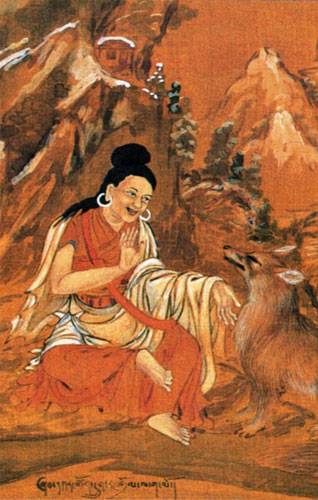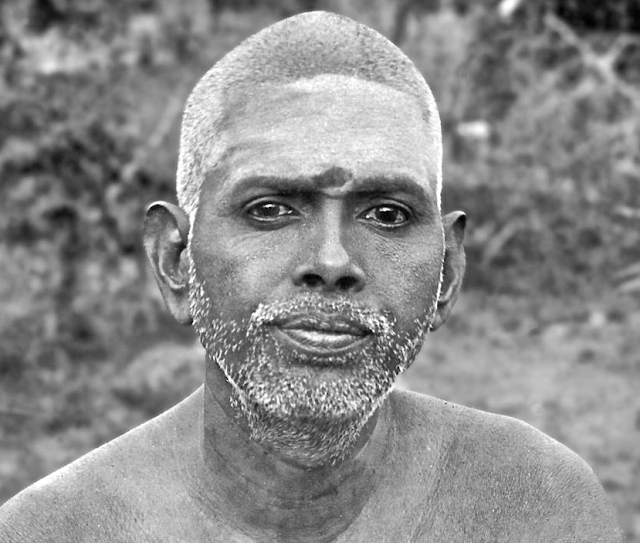“Once in the 1940s, I was sitting outside the hall with many
devotees. Bhagavan was reclining on a couch. A group of learned pandits was
discussing passages from the Upanishads with great enthusiasm and profundity.
All, including Bhagavan, appeared to be attentively listening to the
interesting discussion when, all of a sudden, Bhagavan rose from the couch,
walked some distance and stood before a villager who was standing looking lowly
with palms joined. All eyes turned to Bhagavan and the villager who was
standing at a distance. They appeared to be conversing. Soon Bhagavan returned
to his couch and the discussion was resumed.
Being curious to know why Bhagavan had to go out to meet a villager, I slipped away from the discussion and caught up with the villager before he left the Ashram. He told me that Bhagavan was asking why I was standing so far and also asked my name, about my village, what I did,
and about my family etc. I enquired, “Did you ask him anything?”
The villager replied, “When I asked him how I could earn his blessings, he asked whether there was a temple in my village and the name of the temple deity. When I told him the deity’s name, he said, go on repeating the name of the deity and you would receive all the blessings needed.”
I came back to Bhagavan’s presence, but lost all interest in the discussions. I felt that the simple humility and devotion of a peasant had evoked a far greater response from our Master than any amount of learning. I then decided that though a scholar by profession, I should always remain a humble, ignorant peasant at heart and pray for Bhagavan’s grace and blessings.’’ – Prof Swaminathan
Being curious to know why Bhagavan had to go out to meet a villager, I slipped away from the discussion and caught up with the villager before he left the Ashram. He told me that Bhagavan was asking why I was standing so far and also asked my name, about my village, what I did,
and about my family etc. I enquired, “Did you ask him anything?”
The villager replied, “When I asked him how I could earn his blessings, he asked whether there was a temple in my village and the name of the temple deity. When I told him the deity’s name, he said, go on repeating the name of the deity and you would receive all the blessings needed.”
I came back to Bhagavan’s presence, but lost all interest in the discussions. I felt that the simple humility and devotion of a peasant had evoked a far greater response from our Master than any amount of learning. I then decided that though a scholar by profession, I should always remain a humble, ignorant peasant at heart and pray for Bhagavan’s grace and blessings.’’ – Prof Swaminathan
Many seekers primarily believe in spiritual
concepts without much practical experience of how to meet their own mind.
Although ‘Shravana’, hearing the teachings, is needed very much at the
beginning, it becomes a hindrance even if it is not followed by experiential
knowledge. To sit down and cultivate a silent, receptive mind state is the
actual training needed.
I had the good fortune to be able to attend
a six months course when I was twenty-two which was like a sheltered
environment enabling me - in the company of other meditators - to sink into
silence more and more as the days and weeks went by. It is not only a pleasant
experience to sit down day after day and meet your own mind, but as you get
quieter the inner confidence and the stability grow as well. All kinds of
states appear, some very still and refined. Also a clearing out of hidden
mental tensions will happen, and all can change quickly, like a spring weather
changing from rain to sunshine back and forth. It becomes very obvious that no
state remains, no bliss stays, as no suffering does as well.
Sri
Ramana said:
“To
be in one’s natural state on the subsidence of thoughts is bliss; if that bliss
be transient, arising and setting... then it is only the sheath of bliss
(anandamaya kosha), not the pure Self. What is needed is to fix the attention
on the pure ‘I’ after the subsidence of all thoughts and not to lose hold of
it. This has to be described as an extremely subtle thought; else it cannot be
spoken of at all, since it is no other than the Real Self. Who is to speak of
it, to whom and how?” Talks 624
“Effort
is necessary so long as thoughts are promiscuous. Because you are with other
thoughts, you call the continuity of a single thought, meditation or dhyana. If that dhyana becomes effortless it will be
found to be your real nature. “ Talks
328
“Dhyana is the chief practice.
A little later Sri Bhagavan continued:
Dhyana means fight. As soon as you begin meditation other
thoughts will crowd together, gather force and try to sink the single thought
to which you try to hold. The good thought must gradually gain strength by
repeated practice. After it has grown strong the other thoughts will be put to
flight.
This
is the battle royal always taking place in meditation.
One
wants to rid oneself of misery. It requires peace of mind, which means absence
of perturbation owing to all kinds of thoughts.
Peace
of mind is brought about by dhyana alone.”
Talks 371
“Give
yourself up to deep meditation. Throw away all other considerations of life.
The calculative life will not be crowned with spiritual success.”
Conscious
Immortality
After this long time retreat I came back
home in a very light and joyful frame of mind, which stayed on for quite a
while afterwards. In the deepest core of my heart was a renewed trust in a natural
inner goodness of life, similar to what children radiate and what attracts us,
like a lost innocence of our own past. Although no mind condition is permanent, trust and confidence are growing from meeting life with this inner lightness in a natural way.









